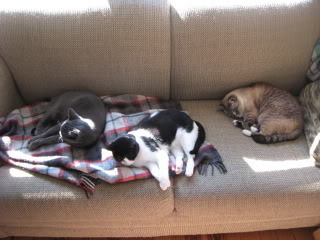Kelly McCullough's Blog, page 47
November 2, 2011
Vampire Wars
Apparently Anne Rice's vampires feel sorry for the sparkly ones. And, frankly, who wouldn't?
Published on November 02, 2011 07:31
October 31, 2011
Happy Halloween!

This from EvilMadScientist.com, maybe too old school BSG for some of you, but I thought it was AWESOME.
Published on October 31, 2011 11:22
October 28, 2011
Friday Cat Blogging
Sunny happy kitties…

Oh yeah!

If I weren't so comfy I'd kill something.

See, speak, and say no evil.

Evil, overflowing its basket.

Dignity and grace in all things.

What Coconut said, but with added evil.



Oh yeah!

If I weren't so comfy I'd kill something.

See, speak, and say no evil.

Evil, overflowing its basket.

Dignity and grace in all things.

What Coconut said, but with added evil.

Published on October 28, 2011 19:38
October 27, 2011
Totally Old-School
I just did something that I'm not entirely convinced other writers do on a regular basis. I just updated my static web site.
I know, weird, right?
Now, I'm going to be REALLY weird and update my psuedonym's page!!
I know, weird, right?
Now, I'm going to be REALLY weird and update my psuedonym's page!!
Published on October 27, 2011 09:54
October 26, 2011
Looking for Solutions, a Future
Unlike Eleanor, I'm not in the least bit concerned that I have no interest in mainstream novels. For me, it's a matter of taste. I like carrots. I don't like tomatoes. Science fiction excites me; mainstream, not so much.
However, her thoughtful post made we consider WHY I like science fiction so much better. The conclusion I've come to is that science fiction (in general) tends to focus on solving a problem. (Unlike mainstream novels, which seem, IMHO, to wallow in them.) Even dystopian focused science fiction novels or movements, like cyberpunk, more often than not end with corrupt governments exposed, defeated, etc. The hero, like Case, might still be living in a back alley, but he will have used his powers for good... or made a valiant try.
This is why I consider THE ROAD by Cormac McCarthy to be mainstream, not science fiction. The ending is bleak and the character's lives simply go from terrible to awful.
That's not science fiction to me. Science fiction is ultimately hopeful.
Of course, not all science fiction novels are deep and meaningful. Because modern science fiction came out of the pulp tradition, sometimes it's just plain fun. I can read books like THE PLUTONIUM BLONDE (John Zakour and Lawrence Ganum) and just enjoy it for what it is: a ripping good yarn.
I don't usually find the same entertainment value in reading about someone's family dysfunction.
However, her thoughtful post made we consider WHY I like science fiction so much better. The conclusion I've come to is that science fiction (in general) tends to focus on solving a problem. (Unlike mainstream novels, which seem, IMHO, to wallow in them.) Even dystopian focused science fiction novels or movements, like cyberpunk, more often than not end with corrupt governments exposed, defeated, etc. The hero, like Case, might still be living in a back alley, but he will have used his powers for good... or made a valiant try.
This is why I consider THE ROAD by Cormac McCarthy to be mainstream, not science fiction. The ending is bleak and the character's lives simply go from terrible to awful.
That's not science fiction to me. Science fiction is ultimately hopeful.
Of course, not all science fiction novels are deep and meaningful. Because modern science fiction came out of the pulp tradition, sometimes it's just plain fun. I can read books like THE PLUTONIUM BLONDE (John Zakour and Lawrence Ganum) and just enjoy it for what it is: a ripping good yarn.
I don't usually find the same entertainment value in reading about someone's family dysfunction.
Published on October 26, 2011 07:15
October 25, 2011
Science Fiction
This is long, but I had to get it out of my system. I have been posting about literary fiction over on my blog and ended by writing this.
I talk mostly about science fiction, but most of it also applies to fantasy.
*
Literary fiction clearly bugs me. Most likely because science fiction and fantasy still don't get the respect they deserve from most of the literary community. But I don't know enough about contemporary literary fiction to criticize it.
So I will talk about what I like about SF & F.
What people think is important. But I am more interested in how people act and how societies change. Technology is important, science is important, because both change our lives and how we think. NASA's Astronomy Photo of Day opens our minds, and lets us see the extraordinary beauty of the universe. It can move us -- mentally -- hundreds of thousands of lightyears. The Internet enables us to hold conversations that go around the planet. For the first time, we can find out what's happening at the level of individual experience everywhere. The New York Times ignored Occupy Wall Street at first, and has not covered it well since it began paying attention. But we have the videos of cops pepper spraying and beating demonstrators, which were taken by cell phones and put on line. We've seen what the demonstrators look like, heard what they have to say. Their signs and stories are all over the Internet.
When I was a kid in the truly strange 1950s, science fiction was the only fiction that explained the world I lived in, which might at any moment be destroyed by nuclear war. Most adults pretended the problem did not exist. Nuclear war was no worse than any other kind of war. All you needed was a fallout shelter in the back yard or a school desk to hid under. But I remember waking up terrified when a siren went off in the night. Science fiction was real. MAD magazine was real. Comic books were real. Because all knew reality was strange and scary and uncertain.
I subscribe to New Scientist and Technology Review. Science and technology are moving too fast for me to keep up; and it isn't one kind of science or technology that is moving fast. They are all going like gang busters. I figure SF is the best way to describe this astoundingly fluid world, changing from moment to moment in a hundred plus ways.
Did you know that slime molds can run mazes? And they could be used in city planning, though no one is doing this yet? They will find the most efficient way to go from A to B; you could use them to lay out a highway system. How do I know this? Some guy ran slime molds over a map of Tokyo. They laid out a highway system as well as city planners.
What do you do with a piece of information like that? I imagine using slime molds to plan cities. Someone is likely to do it. I also think of an organism that is usually single celled, but can become multicelled -- two different kinds of multicelled, if I'm remembering correctly, one a network and one a kind of hierarchy. The guys on top of the hierarchy get to reproduce. I am trying to imagine an alien society which is usually an anarchy, but can form two kinds of social organizations when needed. In a sense, Occupy Wall Street is like this: separate individuals coming together to form a network with distributed power.
I guess I will give one more example or pair of examples: Margaret Atwood's famous novel The Handmaiden's Tale and Suzette Hayden Elgin's far less well known science fiction novel Native Tongue.
I started The Handmaid's Tale, but gave up on it. Atwood established her idea: the US has turned into a religious patriarchy that enslaves women. But as far as I got into the novel, there were no more ideas, and I couldn't see why I should read a depressing book that was going to go on and on, with nothing new happening. (Many SF fans loved Atwood's book, by the way.) Elgin began with the same idea, then added her ideas about language, which are respected among linguists. (She was a linguist, teaching at the university level.) And she added aliens. I finished Native Tongue and read the sequel.
One idea is not enough in this world, where change comes from every direction, unless you are writing a short story.
I talk mostly about science fiction, but most of it also applies to fantasy.
*
Literary fiction clearly bugs me. Most likely because science fiction and fantasy still don't get the respect they deserve from most of the literary community. But I don't know enough about contemporary literary fiction to criticize it.
So I will talk about what I like about SF & F.
What people think is important. But I am more interested in how people act and how societies change. Technology is important, science is important, because both change our lives and how we think. NASA's Astronomy Photo of Day opens our minds, and lets us see the extraordinary beauty of the universe. It can move us -- mentally -- hundreds of thousands of lightyears. The Internet enables us to hold conversations that go around the planet. For the first time, we can find out what's happening at the level of individual experience everywhere. The New York Times ignored Occupy Wall Street at first, and has not covered it well since it began paying attention. But we have the videos of cops pepper spraying and beating demonstrators, which were taken by cell phones and put on line. We've seen what the demonstrators look like, heard what they have to say. Their signs and stories are all over the Internet.
When I was a kid in the truly strange 1950s, science fiction was the only fiction that explained the world I lived in, which might at any moment be destroyed by nuclear war. Most adults pretended the problem did not exist. Nuclear war was no worse than any other kind of war. All you needed was a fallout shelter in the back yard or a school desk to hid under. But I remember waking up terrified when a siren went off in the night. Science fiction was real. MAD magazine was real. Comic books were real. Because all knew reality was strange and scary and uncertain.
I subscribe to New Scientist and Technology Review. Science and technology are moving too fast for me to keep up; and it isn't one kind of science or technology that is moving fast. They are all going like gang busters. I figure SF is the best way to describe this astoundingly fluid world, changing from moment to moment in a hundred plus ways.
Did you know that slime molds can run mazes? And they could be used in city planning, though no one is doing this yet? They will find the most efficient way to go from A to B; you could use them to lay out a highway system. How do I know this? Some guy ran slime molds over a map of Tokyo. They laid out a highway system as well as city planners.
What do you do with a piece of information like that? I imagine using slime molds to plan cities. Someone is likely to do it. I also think of an organism that is usually single celled, but can become multicelled -- two different kinds of multicelled, if I'm remembering correctly, one a network and one a kind of hierarchy. The guys on top of the hierarchy get to reproduce. I am trying to imagine an alien society which is usually an anarchy, but can form two kinds of social organizations when needed. In a sense, Occupy Wall Street is like this: separate individuals coming together to form a network with distributed power.
I guess I will give one more example or pair of examples: Margaret Atwood's famous novel The Handmaiden's Tale and Suzette Hayden Elgin's far less well known science fiction novel Native Tongue.
I started The Handmaid's Tale, but gave up on it. Atwood established her idea: the US has turned into a religious patriarchy that enslaves women. But as far as I got into the novel, there were no more ideas, and I couldn't see why I should read a depressing book that was going to go on and on, with nothing new happening. (Many SF fans loved Atwood's book, by the way.) Elgin began with the same idea, then added her ideas about language, which are respected among linguists. (She was a linguist, teaching at the university level.) And she added aliens. I finished Native Tongue and read the sequel.
One idea is not enough in this world, where change comes from every direction, unless you are writing a short story.
Published on October 25, 2011 10:41
October 22, 2011
Blogging and Facebooking
I read the Jim Hines conversation about doing stuff on the Internet. I blog and am on facebook. I have mixed opinions re blogging. I have a blog so people can find me via Google. The blog has an email address attached so people are able to write me. Sometimes this is useful. Not everyone has a copy of the SFWA Directory. I keep the blog up, because it tells anyone looking for me that I'm still alive and still able to write.
But I am not a natural blogger. I find it hard to do, and it takes a lot of time. I think the effort I put in is obvious. My style is not fluid, chatty and fun. It's like chainsaw sculpture. Okay, this guy cut a bear out of tree trunk. Well, it's not much of a bear. Looking at it, all you see is that it was hard to do.
But the blog gives me a place to put my poetry, and it gives me a place to think out loud, and people can find me. So it's worth it. I think.
I love facebook. Unlike the blog, where I mostly speak to silence, I get immediate feedback. The length constraints -- 420 characters -- mean I am forced to write short notes, mostly about the weather and what I had for breakfast and whatever I've done lately that was fun. I love how trivial all this is.
And I post links to articles and images I like, rather than writing about them. Here, this is the NASA photo of the day. Here, this is an article in The Guardian about Occupy Everywhere.
It can eat time, but I don't feel the effort I feel when I blog.
I don't think any of this is especially useful to my writing career. Yes, it has helped John Scalzi and Cory Doctorow, but they are exceptional. I figure, do what you want, so long as you still have time to do your real writing. A little visibility is not going to hurt.
I feel I've written or said this before. Well, I mull a lot, and come back to the same topics. Sometimes the mulling proves useful and sometimes not.
But I am not a natural blogger. I find it hard to do, and it takes a lot of time. I think the effort I put in is obvious. My style is not fluid, chatty and fun. It's like chainsaw sculpture. Okay, this guy cut a bear out of tree trunk. Well, it's not much of a bear. Looking at it, all you see is that it was hard to do.
But the blog gives me a place to put my poetry, and it gives me a place to think out loud, and people can find me. So it's worth it. I think.
I love facebook. Unlike the blog, where I mostly speak to silence, I get immediate feedback. The length constraints -- 420 characters -- mean I am forced to write short notes, mostly about the weather and what I had for breakfast and whatever I've done lately that was fun. I love how trivial all this is.
And I post links to articles and images I like, rather than writing about them. Here, this is the NASA photo of the day. Here, this is an article in The Guardian about Occupy Everywhere.
It can eat time, but I don't feel the effort I feel when I blog.
I don't think any of this is especially useful to my writing career. Yes, it has helped John Scalzi and Cory Doctorow, but they are exceptional. I figure, do what you want, so long as you still have time to do your real writing. A little visibility is not going to hurt.
I feel I've written or said this before. Well, I mull a lot, and come back to the same topics. Sometimes the mulling proves useful and sometimes not.
Published on October 22, 2011 21:25
Soft Kitty
Published on October 22, 2011 09:04
October 21, 2011
OMG The Twitter!
Jim Hines talks smart about blogging and other such on-line promotions on his LJ.
Published on October 21, 2011 07:58
October 19, 2011
Buried What Now?
Sometimes my subconscious digs up buried treasure and hands it over. Sometimes what it digs up just needs to have the dirt kicked back over it.
Sunday it produced 80 percent of a 1st draft at a poem that I'm fairly happy with. The words just spilled out of my brain and straight onto the paper. Treasure!
Today it gave me "Amaranth Bloodhagen First Lordmaster of Ghu." Excuse me? Amaranth Bloodhagen? That's not a name, it's an ice cream flavor for vampires. Which is doubly silly since everyone knows vampires are lactose intolerant.
*pauses, blinks*
You know, maybe my inner humorist could do something with that. The ballad of Amaranth Bloodhagen, perhaps? But, later, when the current book is done.
Sunday it produced 80 percent of a 1st draft at a poem that I'm fairly happy with. The words just spilled out of my brain and straight onto the paper. Treasure!
Today it gave me "Amaranth Bloodhagen First Lordmaster of Ghu." Excuse me? Amaranth Bloodhagen? That's not a name, it's an ice cream flavor for vampires. Which is doubly silly since everyone knows vampires are lactose intolerant.
*pauses, blinks*
You know, maybe my inner humorist could do something with that. The ballad of Amaranth Bloodhagen, perhaps? But, later, when the current book is done.
Published on October 19, 2011 07:09
Kelly McCullough's Blog
- Kelly McCullough's profile
- 369 followers
Kelly McCullough isn't a Goodreads Author
(yet),
but they
do have a blog,
so here are some recent posts imported from
their feed.










